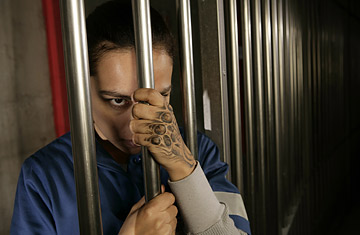
HBO's Capadocia
Hardened women prisoners batter each other with metal bars in a grimy jail. A corrupt prison warden carries out shady deals in dark streets. Masked riot police storm into the penitentiary machine guns blazing.
It doesn't look like the usual Mexican telenovela, packed with scantily clad girls, dashing macho men and unceasing melodrama. And there's a lot more about Capadocia, HBO's first attempt to crack the Mexican market, that sets it apart from any other Latin American TV production. Shot on 400,000 feet of film, with three movie directors and 300 actors, it is probably the most expensive TV series ever made south of the Rio Grande. HBO executives wouldn't release the exact cost, but said that one episode of Capadocia costs about the same as 250 episodes of a typical telenovela — which are shot on video, in studios and with a few on-salary celebrities.
The show is a big gamble for the American pay-cable network, best known for hits like The Sopranos and Sex and the City, but HBO executives are confident their venture into the Mexican TV market will pay off. "There are millions of viewers across Latin America screaming out for shows with more quality and realism," said Miguel Angel Oliva, Vice President of Corporate Affairs at HBO Latin America. "And from Tijuana down to Patagonia, there is an immense talent among actors, directors and writers dying to make them."
HBO has made smaller-scale dramas for Latin American countries like Argentina and Brazil. But this is its first venture into Mexico, the undisputed leader in Latin American film and TV production. While Mexico's steamy telenovelas are cheap to make, they are wildly popular across the globe, being translated into over 50 languages from Russian to Indonesian. Teaming up with Mexican production company Argos, HBO brought in top cinema talent such as Carlos Carrera, director of the controversial hit film The Crime of Father Amaro, about a priest's affair with a teenage girl. It also persuaded Mexican authorities to let it work with dozens of real-life female prisoners, who play extras in Capadocia. The scarred and hardened faces of these women prisoners adds to the realism to the portrayal of violence and intimidation behind bars. "It was a very emotional experience working with the prisoners," said leading actress Dolores Heredia. "These were women who had committed grave crimes. But we saw their human side. We laughed together and we cried together."
The original idea came from HBO's successful drama Oz, which focuses on a U.S. high security prison. The writers also based some of the story on real-life events and characters, drawing most of the inspiration from Mexico City's infamous Santa Marta women's prison. The result is a series that is as grim, bloody and chaotic as actual Latin American prisons; it is world where children live with their mothers behind bars until they are six, where corruption is rife and where killings are commonplace. But aside from portraying the misery of prison life, the producers also aimed to forge the kind of compulsive dramas that will attract Mexican TV fans. "We certainly understand drama in Latin America and that is what makes the telenovelas so popular," said executive producer Andres Tagliavini. "We wanted to keep that dramatic flavor. But at the same time, we wanted to raise the bar in terms of acting and cinematography."
Since Capadocia began to air across Latin America in March, initial ratings have been promising. But it remains to be seen whether audiences will be able to stomach the heavy dose of violence and realism on a regular basis. Many in countries with crime and corruption problems may prefer not to see the misery replayed in their entertainment. One of the reasons telenovelas are so successful in the developing world is that they offer a pleasant escape, where the virtuous are rewarded and the endings are happy.
However, HBO's Oliva said his confidence in Capadocia was bolstered by the reaction of his 70-year-old mother to the series. At first, Oliva was worried the graphic violence, swearing and lesbian sex scenes would earn him a scolding. "I thought she might be angry with me," Oliva said. "Instead she told me, 'That is the reality in our country.' And she was dying to watch the second episode."
